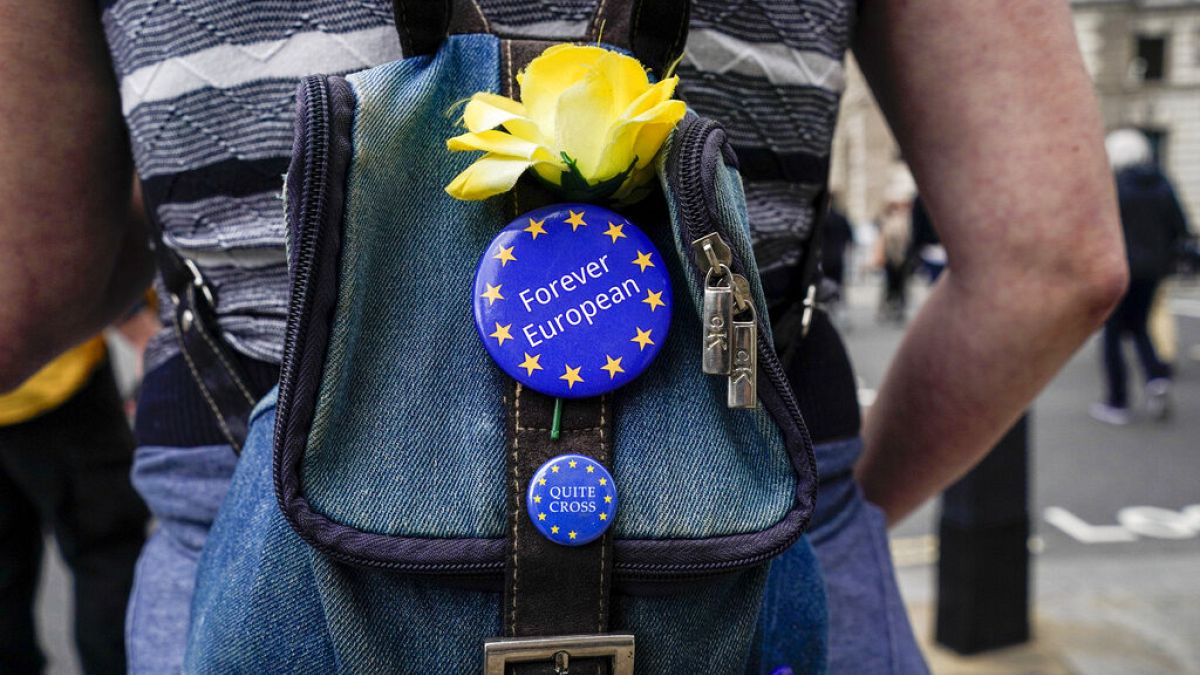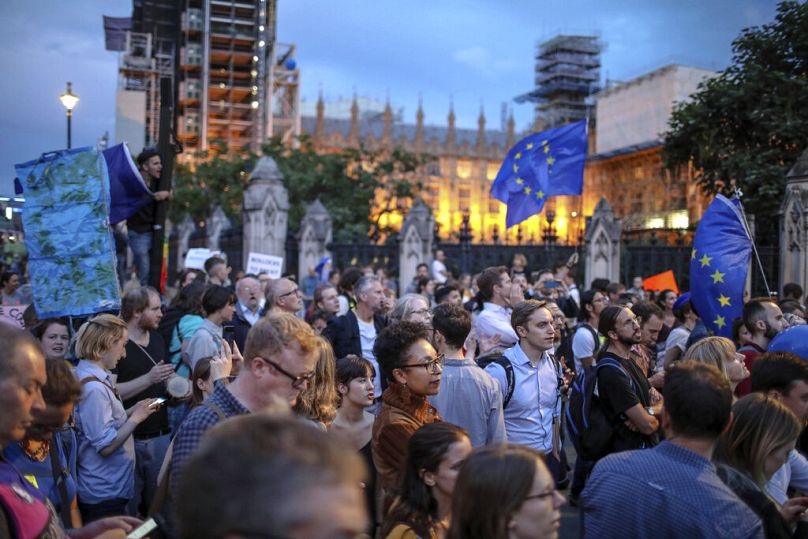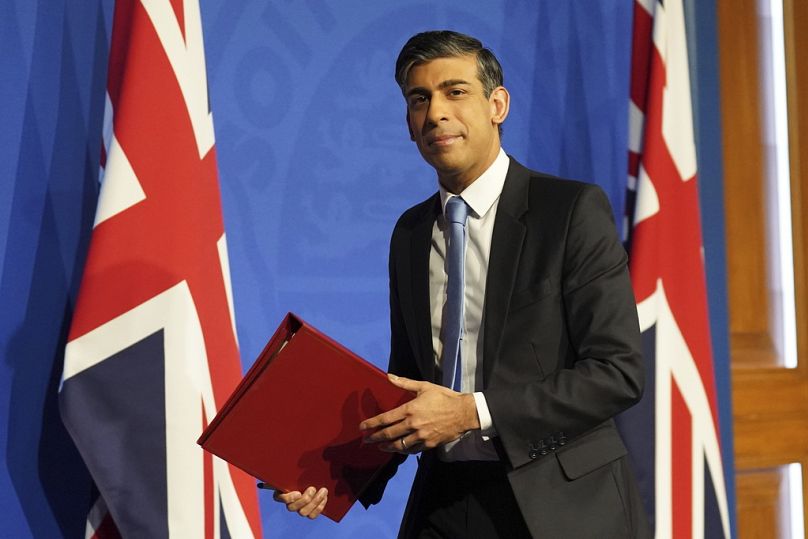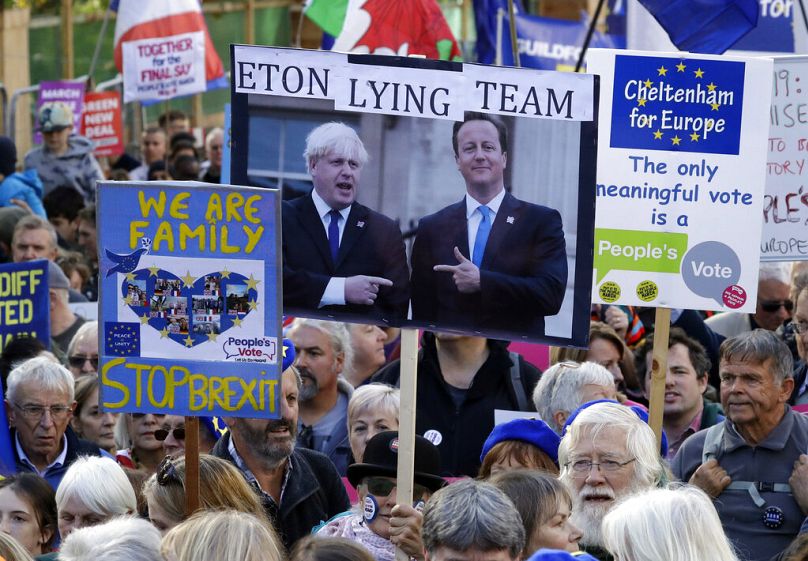EU citizens in the UK are "expected to beg, bend their knee and show remorse for not knowing" about post-Brexit visa changes, Euronews was told.
Before Brexit became official on 31 January 2020, life for EU citizens living in the UK was fairly straightforward.
But everything changed after that date.
Many people who had lived in the UK for more than 10 years and had been granted permanent residency cards were told they had no right to live there any more.
That's because the Home Office explained they hadn’t applied to the EU Settlement Scheme by the 30 June 2021 deadline.
Still, a large number of EU citizens say they simply weren’t aware of the change.
Following outrage from these people - and others representing them - the government said in January they may now be allowed to stay in the UK.
Changes aren't enough
The3million is a grassroots organisation established in the UK to represent EU citizens living in the country after the 2016 Brexit referendum.
The movement told Euronews the government U-turn will likely not go far enough.
Under the government changes, those who settled in the UK before Brexit and were previously granted permanent residence cards will now be able to make a late application to the EU Settlement Scheme - yet only in some circumstances.
As Andreea Dumitrache, Communications Manager at the3million explained: “These are still very limited in scope, and a majority of late applicants are still expected to be confronted with huge barriers to get their application to be considered.”
Some 50 organisations asked the government for changes through a letter coordinated by the3million - but they think it’s too little, too late.
“We’re disappointed the Home Office still does not accept that having an EEA permanent residence card in itself is sufficient evidence for reasonable grounds for applying late," Dumitrache told Euronews.
“People are also expected to beg, bend their knee and show remorse for not knowing. We are concerned this will lead to only people with access to legal advice to be able to get their application through,” she added.
Massimo and Dee, an Italian couple who moved to Belfast in January 2023 were victims of this apparent lack of transparency from the government since Brexit came into force.
They ran a small food outlet providing traditional Italian pizza and street food, serving the local community, but soon saw both their business account and Massimo’s current account blocked by their bank.
The restaurant owners told Euronews: “We only knew as we were trying to process a supplier payment and it didn’t go through. We contacted the bank but they wouldn’t tell us anything or advise how this could be resolved.”
Dee explained they felt “devastated, humiliated and concerned.”
Massimo in particular, “felt let down by the country he had lived in for over 20 years, where he had provided employment for many people over the years, paid his taxes and given back to the local community. We didn’t know which way to turn and received incorrect advice from several sources.”
Before discovering the3million, Dee and Massimo contacted the Home Office directly.
“They wouldn’t advise on what course of action we should take. We researched on the government websites but there was no clear guidance for people in Massimo’s situation who already held a residency card,” Dee said.
It was only after paying for an immigration lawyer that they were given any clarity and idea about what to do next.
Dee still holds a lot of anger towards the government.
"They should have specifically mentioned that even those with a permanent residency card (with no expiration date) still needed to apply. In fact, they should have contacted holders of the card and advised them, as was the case in other countries with similar permits, such as Denmark."
After a great deal of stress, Dee managed to get her business account reinstated after removing her husband as a director and completing a change of mandate details.
She says it took the bank a month to sort out and now their business is “ruined” and they “won’t be in a position to reopen it.”
This kind of story is all too familiar for Andreea Dumitrache.
“It is the most vulnerable who will suffer,” she told Euronews, “vulnerable EU citizens, those living in poverty, ethnic minorities, those who are not digitally literate, can still be refused, despite living in this country for years, if they do not tick all the additional boxes.”
She is concerned that people who were aware of the need to reapply may still be in danger of losing their right to stay in the UK.
“Others will have been told by the Home Office to reapply following a previous incorrect refusal and will now be considered not to have a reasonable ground for a late application,” she said.
According to the3million, it appears as if the Home Office is working off the assumption that people will encounter a "trigger event" and find out they need to apply at an already difficult time.
“People can live in the UK for years without a trigger event making them aware they need to secure status. This was made exceedingly clear by the Windrush scandal, in which many people discovered their lack of proof of status many years after changes in policy and legislation,” Dumitrache explained.
The Home Office say they have been clear with their new policy.
“Permanent residence documents issued under the EEA Regulations confirmed a person’s status in the UK under EU free movement rules." they said. "We have long been clear that such documentation ceased to be valid at the end of the grace period on 30 June 2021.”
“More than two years have passed since the deadline for applying to the scheme, which was widely publicised. In line with our Citizens’ Rights Agreements commitments, we continue to accept and consider late applications from those with reasonable grounds for their delay in applying.”
Dumitrache refutes this claim, though.
“Politicians promised EU citizens would retain their rights after Brexit. This government needs to take responsibility and change this culture of disbelief in the Home Office. The most vulnerable cannot be those who suffer the burden and have their lives destroyed,” she said.
Under the terms of the Brexit withdrawal agreement, the UK must guarantee the rights of EU citizens living legally in the country before leaving the bloc. In turn, EU countries must do the same for British citizens living there.
After the scheme was closed in June 2021, the government promised they would take late applications if there were “reasonable grounds”.
In August last year, however, Rishi Sunak’s lawmakers changed the rules so a lack of awareness of the EU settlement scheme was no longer a justification for not applying.
The3million has now called on the government to take further action, saying their decisions are simply not in the spirit or substance of the Brexit withdrawal agreement.
The organisation says they are not doing enough to ensure that the “reasonable grounds” promise is being upheld and are accusing them of effectively removing safeguards previously put in place for EU citizens to have full access to their rights.
While Dee and Massimo are on the way to getting back on their feet - although they are not sure they will stay in the country after the way they have been treated by the government and their bank - thousands of other EU citizens in the UK are just at the beginning of their possibly treacherous journeys.
“I struggle to think of any benefits (of Brexit),” Dee told Euronews.
“We have always striven to source foods locally and support the UK economy, customers want authentic Italian food which can only be achieved by including Italian ingredients. Brexit drove up the prices of food to such an extent that many family run businesses were forced to close their doors,” she said.
Dee, and many others, fear for the future of EU citizens' role in the UK if the government does not make yet another U-turn.




